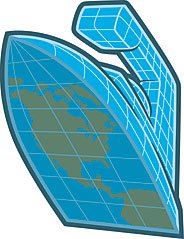week5-Topic1 The World Is Flat
 The notion of a flat Earth refers to the idea that the inhabited surface of Earth is flat, rather than a curved spherical Earth. Belief in a flat Earth is found in mankind's oldest writings. In early Mesopotamian thought, the world was portrayed as a flat disk floating in the ocean, and this forms the premise for early Greek maps.
The notion of a flat Earth refers to the idea that the inhabited surface of Earth is flat, rather than a curved spherical Earth. Belief in a flat Earth is found in mankind's oldest writings. In early Mesopotamian thought, the world was portrayed as a flat disk floating in the ocean, and this forms the premise for early Greek maps.By classical times an alternative idea, that Earth was spherical, had appeared. This was espoused by Pythagoras, apparently on aesthetic grounds, as he also held all other celestial bodies spherical. Aristotle provided observational evidence for the spherical Earth, noting that travelers going south see southern constellations rise higher above the horizon. This is only possible if their horizon is at an angle to northerners' horizon. Thus the Earth's surface cannot be flat. Also, the border of the shadow of Earth on the Moon during the partial phase of a lunar eclipse is always circular, no matter how high the Moon is over the horizon. Only a sphere casts a circular shadow in every direction, whereas a circular disk casts an elliptical shadow in most directions.
The concept of a spherical Earth was espoused by Pythagoras apparently on aesthetic grounds, as he also held all other celestial bodies to be spherical. It replaced widespread belief in a flat Earth: In early Mesopotamian thought the world was portrayed as a flat disk floating in the ocean, and this forms the premise for early Greek maps like those of Anaximander and Hecataeus. Other speculations as to the shape of Earth include a seven-layered ziggurat or cosmic mountain, alluded to in the Avesta and ancient Persian writings. In fact, the Earth is an oblate spheroid.
Above is the process that how people’s thoughts changed. From the flat world to the spherical world, now we regain a flat world.
I think what Friedman meant by “the flat world” is the process people removing the obstacles in politics and economics, moreover, increasing people’s communications.
 The metaphor of a flat world, used by Friedman to describe the next phase of globalization, is ingenious. It came to him after hearing an Indian software executive explain how the world's economic playing field was being leveled. For a variety of reasons, what economists call ''barriers to entry'' are being destroyed; today an individual or company anywhere can collaborate or compete globally. Bill Gates explains the meaning of this transformation best. Thirty years ago, he tells Friedman, if you had to choose between being born a genius in Mumbai or
The metaphor of a flat world, used by Friedman to describe the next phase of globalization, is ingenious. It came to him after hearing an Indian software executive explain how the world's economic playing field was being leveled. For a variety of reasons, what economists call ''barriers to entry'' are being destroyed; today an individual or company anywhere can collaborate or compete globally. Bill Gates explains the meaning of this transformation best. Thirty years ago, he tells Friedman, if you had to choose between being born a genius in Mumbai or
Wow~ So surprised. We always seek every chance we have in our lives. But in the flat world, it seems that globalization only push us to face more competitions. The third world is a broad and blooming market or a competitive and cruel battlefield? Who really get benefit during the process of globalization?
Here comes a new phenomenon in the coming future, so called “the M Society” which means the mid-class is dying out, while the amount of the rich and the poor is getting up. We face much more pressures in life. You used to think that you can win the battle easily, but now, you have to pay ten times attentions.
On the other hand, as an Asian person, do I really have enough ability to “knockdown” Americans? Or I am just a victim in the trend of flatten the world?
I think the best way to reconcile the crisis is to modify the divide between different cultures. We always could cooperate rather than compete. Trying to minify the digital or technology divide, thus most human beings can get benefits from new technology.
Who is here to lead? Neither western people nor Asian people, I think only people with proper abilities and learning aspirations could get victories in the battle.

0 Comments:
Post a Comment
<< Home